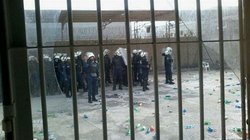 Prison guards in Bahrain are reportedly denying appropriate healthcare and pain-relief medication to two imprisoned political dissidents, as the ruling Al Khalifah regime presses ahead with its heavy clampdown on political dissidents and pro-democracy activists in the tiny Persian Gulf kingdom.
Prison guards in Bahrain are reportedly denying appropriate healthcare and pain-relief medication to two imprisoned political dissidents, as the ruling Al Khalifah regime presses ahead with its heavy clampdown on political dissidents and pro-democracy activists in the tiny Persian Gulf kingdom. RNA - Prominent Bahraini human rights advocate Ebtisam al-Saegh said on Sunday that authorities in Jaw Prison, which lies south of the capital Manama, have delayed treatment for 23-year-old Hussein al-Fardan, who suffers from sickle cell anemia and is requesting to be transferred to hospital, the Arabic-language Lualua television network reported.
His father is said to have lodged several complaints with both the prison and related oversight bodies, but the measures have failed to improve Hussein’s access to health care.
Another prisoner, identified as Hussein Abdulaziz al-Mori, is being denied treatment for a skin rash and retinal detachment.
The notorious Jaw Prison is the largest prisoner facility in Bahrain and is used to hold peaceful protesters, who participated in anti-regime demonstrations.
On May 18, Lualua TV reported that imprisoned Bahraini political activist Hussein Moussa, who is on the Manama regime’s death row and could be executed at any time, was not receiving appropriate medical care.
His family said the prisoner had been denied treatment for weeks despite the fact that he had been experiencing severe pain and swelling in his leg, which had made him unable to walk.
Thousands of anti-regime protesters have held demonstrations in Bahrain on an almost daily basis ever since a popular uprising began in the country in mid-February 2011.
They are demanding that the Al Khalifah regime relinquish power and allow a just system representing all Bahrainis to be established. Manama has gone to great lengths to clamp down on any sign of dissent. On March 14, 2011, troops from Saudi Arabia and the United Arab Emirates were deployed to assist Bahrain in its crackdown.
On March 5, 2017, Bahrain’s parliament approved the trial of civilians at military tribunals in a measure blasted by human rights campaigners as being tantamount to imposition of an undeclared martial law countrywide.
Bahraini monarch King Hamad bin Isa Al Khalifah ratified the constitutional amendment on April 3, 2017.
847/940